CIA Sponsored Terror, Civil Liberties, Civil Rights, Criminalizing Dissent, Human Rights, Iraq War, Military Tribunal, Political Prisoner, Prison Industry, Targeting Muslims, Torture, Truth to Power, U.S. Militarism, Violations of U.S. and International Law
Podcast: Play in new window | Download
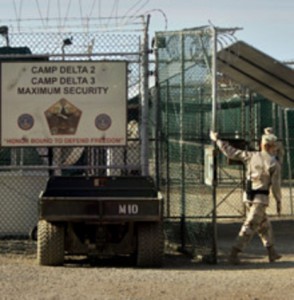

Twenty Years Later Guantanamo Is Everywhere
The George W. Bush administration used the terrorist attacks on 9/11 to launch his so-called “Global War on Terror.” Under the guise of fighting terrorism, Bush illegally invaded two countries, instituted an unlawful dragnet of Arab men and boys in the United States, and opened a sinister prison camp at Guantanamo Bay, Cuba in January 2002.
Nearly 800 men and boys were sent to Guantanamo, where many of them were subjected to torture and cruel treatment, and held indefinitely – many without charges, in violation of US and international law. Much of this mistreatment was documented in the “Guantanamo Files,” 779 secret files published in 2011 by WikiLeaks. It was documented as well in the report of the Senate Select Committee on Intelligence. The 6,700-page report remains secret but the 499-page executive summary was published in 2014.
By locating the prison in Cuba, Bush sought to preclude any judicial review of the detention of the detainees. Most of them had no connection to terrorism. Locked away in Guantanamo for years, detainees lost hope. The only power they had was to refuse food. Many of them engaged in a hunger strike but were violently force-fed, a practice that amounts to torture.
The widely esteemed lawyer and co-founder of Law and Disorder, Michael Ratner, was Legal Director of the Center for Constitutional Rights when the center filed the landmark case of Rasul v. Bush. It went to the Supreme Court, which ruled that Bush could not prevent detainees from challenging the legality of their detention in US courts. But 20 years later, Guantanamo remains open and 39 men are still there.
We are fortunate to have Baher Azmy with us today to discuss Guantanamo and the “war on terror” which continues today, with very little pushback from the American public.
Guest – Baher Azmy is Legal Director of the Center for Constitutional Rights, where he directs all litigation around issues related to the promotion of civil and human rights. He is also professor of law at Seton Hall University.
—-


Dangerous Influence of Right Wing Propaganda
Hosts examine the over-all current role of the corporate, mainstream media in America today, in particular the increasing power and danger of the right-wing media. And to do so we are very fortunate to have as our guest today, Jeff Cohen.
Guest – Jeff Cohen is a highly regarded progressive critic of the media. Indeed, he was recently quoted in an important article in the Washington Post about the disclosure that FOX News hosts were advising the White House during the January 6th insurrection. Jeff Cohen, along with Martin Lee, were the co-founders of Fairness and Accuracy in Reporting, or “F.A.I.R.,” which is the anti-corporate media group that monitors and reports on the mainstream media’s bias, spin and misinformation. Jeff Cohen is also a lecturer on these matters and the author of the book, Cable News Confidential.

—————————–
Censorship, Civil Liberties, Human Rights, Military Tribunal, Racist Police Violence, Right To Dissent, Truth to Power
Podcast: Play in new window | Download
Kyle Rittenhouse got away with murder and the growing forces of violent reaction have been emboldened. Trump invited Rittenhouse to Mar-a-Lago and praised him as a “fine young man.” Street thuggery and violence against the opponents of his fascist party was the hallmark of Hitler’s rise to power. His goons, called Brown Shirts, smashed enemies on the left, trade unionist, and socialists. But Hitler always denied that he had any connection with the Brown Shirts, attempting to perpetuate an illusion that he respected the rule of law.
In 1931, two years before Hitler and the German fascists eventually took power, the courageous young German lawyer Hans Litten sued Hitler in Berlin. He put Hitler on the witness stand grilling him for three hours. He showed Hitler to be a liar. By contrast, and as a measure of how serious things have gotten in our country , Kyle Rittenhouse continues to be wildly praised by the right and the fascists, like the Proud Boys with whom he took publicity shots. They all have mobilized behind Rittenhouse. We rebroadcast what we believe to be two profound interviews on what fascism is and how to fight it.
—-
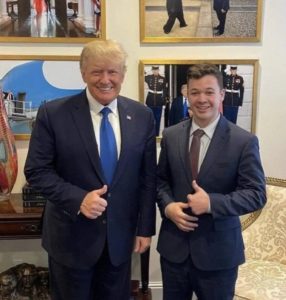
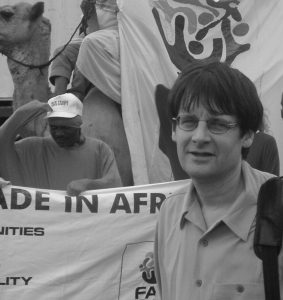
This is Not Populism : John Bellamy Foster
Is Trump a neofascist? Thoughtful analysts on the left like Cornell West, Noam Chomsky, and Judith Butler think he is. But mainstream liberal commentators refuse to associate the Trump phenomena with fascism. They call him a right wing populist. What is neofascism? Right wing Populism? Does it really matter what Trump is called? The great German playwright and political thinker who lived in Germany during Hitler’s reign, Berthold Brecht, asked in 1935: “How can anyone tell the truth about fascism, unless he’s willing to speak out against capitalism, which brings it fourth?” We speak today with John Bellamy Foster, the editor of the venerable magazine “Monthly Review”. He wrote the lead article in the current June 2017 issue titled “This Is Not Populism.”
Guest – John Bellamy Foster is editor of Monthly Review and professor of sociology at the University of Oregon. He has written widely on political economy and has established a reputation as a major environmental sociologist. He is the author of Marx’s Ecology: Materialism and Nature (2000), The Great Financial Crisis: Causes and Consequences (with Fred Magdoff, 2009), The Ecological Rift: Capitalism’s War on the Earth (with Brett Clark and Richard York, 2010), and The Theory of Monopoly Capitalism: An Elaboration of Marxian Political Economy (New Edition, 2014), among many others.
—-
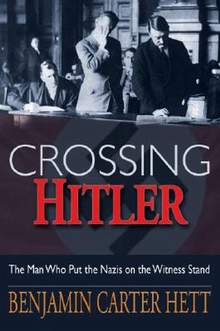

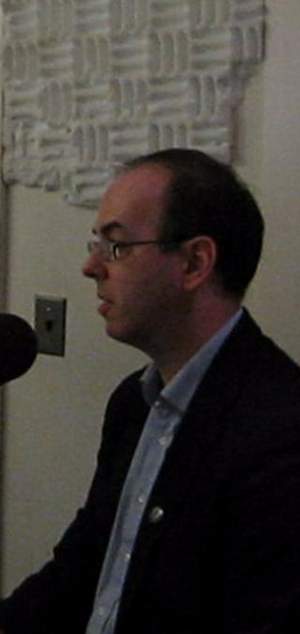
Crossing Hitler: The Man Who Put the Nazis on the Witness Stand
Author Benjamin Hett outlines the fascinating and tragic story of a young lawyer Hans Litten in his recent book Crossing Hitler: The Man Who Put the Nazis on the Witness Stand. Before the Nazis rose to power in the early 1930s, they incited calculated violence among the working class in German taverns. Four Nazi stormtroopers were charged with firing randomly into a dance hall where a communist hiking club were holding a party. Three young men were wounded. Hans Litton was the advocate for the 3 men.
Hans Litten called Hitler to the witness stand to show that the Nazi party was a violent party, and by cross examining Hitler he tried to prove that. Litten forced Hitler to contradict himself, reducing him to humiliating rage that revealed his true intention. At that time, Hitler wanted to be a legal party in Germany and of course you couldn’t be a party that was extra-constitutional and legal but at the same time he didn’t want to disappoint the base of his party which was this violent working class aspect. Two years later, the Nazi Party rose to power.
What came after the Reichstag Fire was the arrest of about 5 thousand people across Germany who the Nazis have identified as opponents or potential opponents. Hans Litten was among them and sent to a concentration camp. Author Benjamin Hett describes a powerful narrative of Hans facing torture yet still telling stories and teaching art to other prisoners.
Hans Litten was born in 1903 in Halle in Central Germany, his father was a law professor and Jewish but converted to German evangelical (Lutheran).
Guest – Benjamin Hett, author of Crossing Hitler: The Man Who Put the Nazis on the Witness Stand. Hett is a former trial lawyer, and now Associate Professor of History at Hunter College.

———————–
CIA Sponsored Terror, Civil Liberties, Human Rights, Iraq War, Military Tribunal, Political Prisoner, Prison Industry, Prosecution of the Bush Administration, Supreme Court, Surveillance, Targeting Muslims, Torture, Truth to Power
Podcast: Play in new window | Download
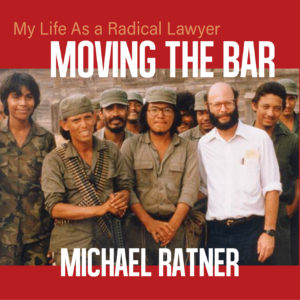
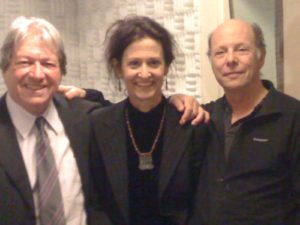
Hosts Heidi Boghosian and Michael Smith interviewed some of Michael Ratner’s closest friends and colleagues as part of a special broadcast highlighting Michael Ratner’s legal work and mentorship. The special also marked the upcoming release of Michael Ratner’s autobiography Moving The Bar: My Life As A Radical Lawyer published by OR Books. In this one hour taken from the two hour fundraiser broadcast, we hear from attorneys including Eleanor Stein, Richard Levy, Ray Brescia, David Cole and Baher Azmy.
—
Michael Ratner’s pathbreaking legal and political work is unmatched. He provided crucial support for the Cuban Revolution and won the seminal case in the Supreme Court guaranteeing the right of habeas corpus to Guantanamo detainees. Michael also challenged U.S. policy in Iraq, Haiti, Nicaragua, Guatemala, Puerto Rico and Israel-Palestine. This book is a testament to his unflagging efforts on behalf of the poor and oppressed around the world.
– Marjorie Cohn, Professor Emerita, Thomas Jefferson School of Law
Michael Ratner personified lawyering that brought both radical and human values into challenges to the use of governmental power to violate the essence of the Bill of Rights. From the torture of prisoners after 911 to the massive racial profiling by the New York Police Department, Michael’s voice and vision continue to resonate. This book provides a powerful testament to the spirit of this extraordinary man.
– Attorney Bill Goodman

Afghanistan War, CIA Sponsored Terror, Civil Liberties, Human Rights, Iraq Veterans, Iraq War, Military Tribunal, Political Prisoner, Prison Industry, Supreme Court, Targeting Muslims, Torture, Truth to Power, War Resister
Podcast: Play in new window | Download


Lawyers You’ll Like: Attorney Nancy Hollander
Occasionally Law And Disorder has featured interviews with significant attorneys. We call this segment of the show Lawyers You’ll Like. One such attorney is today’s guest, Nancy Hollander. She has been practicing criminal defense lawyer in Albuquerque, New Mexico and has been a partner since 1980 in the law firm of Freedman, Boyd, Hollander, Goldman, Urias, and Ward.
Nancy Hollander‘s practice has largely been devoted to representing individuals and organizations accused of crimes, including those involving national security issues.
She was one of the attorneys in the landmark Holy Land Five case. She won whistle blower Chelsea Manning’s release in 2017 when President Obama commuted her sentence from 35 years to seven years. Although not currently representing Manning she has met with her recently. Manning has been jailed for two months for refusing to cooperate with a grand jury in Virginia which is investigating Julian Assange of WikiLeaks. Manning released the famous Iraqi war log video showing American war crimes in Iraq to Julian Assange of WikiLeaks. He is in prison in London awaiting extradition and trial in Virginia where he faces 175 years in prison if convicted of Espionage Act violations. She represented Mohamedou Ould Slahi, whose release she obtained after he served 15 years in Guantanamo without ever being charged.
Write to Chelsea Manning:
Chelsea Manning – AO181426
William D. Truesdale Adult Detention Center
2001 Mill Road
Alexandria, Virginia 22314
Guest – Attorney Nancy Hollander has been a member of the firm Freedman Boyd Hollander Goldberg Ives & Duncan, P.A. since 1980 and a partner since 1983. Her practice is largely devoted to criminal cases, including those involving national security issues. She has also been counsel in numerous civil cases, forfeitures and administrative hearings, and has argued and won a case involving religious freedom in the United States Supreme Court. Ms. Hollander also served as a consultant to the defense in a high profile terrorism case in Ireland, has assisted counsel in other international cases and represents two prisoners at Guantanamo Bay Naval Base. Nancy is co-author of WestGroup’s Everytrial Criminal Defense Resource Book, Wharton’s Criminal Evidence, 15th Edition, and Wharton’s Criminal Procedure, 14th Edition. She has appeared on national television programs as PBS Now, Burden of Proof, the Today Show, Oprah Winfrey, CourtTV, and the MacNeill/Lehrer News Hour.
—-

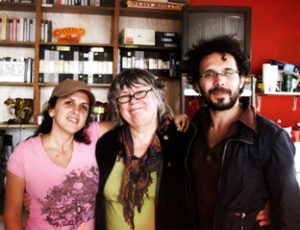
Supreme Court: Cable Companies Can Limit Public Access
Last month United States Supreme Court in a 5 to 4 decision written by Brett Kavanaugh decided that TV cable companies can, in the words of our guest, losing plaintive DeeDee Halleck, “censor whatever, whoever, and whenever they want.”
Cable companies like Manhattan Neighborhood Network can now limit public access that carry TV shows to be available in hundreds of cities and towns.
The Supreme Court held that Manhattan Neighborhood Network is not subject to First Amendment constraints, that the free-speech clause of the First Amendment prohibits only governmental, not private abridgment of speech and that MNN is a private company.
Judges Cavanagh, Robert, Thomas, Alito, and Gorsuch is found against the free-speech argument of Halleck and her co-plaintiff Jesus Melendez. Judge Sotomayor wrote the dissent which was joined in on by Ginsberg, Breyer and Kagan.
Guest – Deedee Halleck one of the plaintiffs in this case and among the top media activists. She’s co-founder of Paper Tiger Television and also the Deep Dish Satellite Network, the first grass roots community television network. She is Professor Emerita in the Department of Communication at the University of California at San Diego.
—————————–

—————————–
CIA Sponsored Terror, Civil Liberties, Human Rights, Iraq War, Military Tribunal, Political Prisoner, Prison Industry, Prosecution of the Bush Administration, Supreme Court, Targeting Muslims, Torture, Truth to Power, War Resister
Podcast: Play in new window | Download
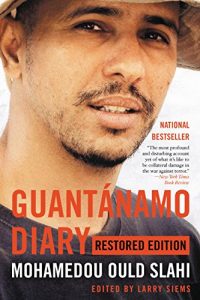

Guantanamo Diary: Mohamedou Ould Slahi
The American offshore prison camp in Guantánamo, Cuba is still operating. After the attacks on September 11, 2001, it was set up as a place where neither American or international law would apply and where prisoners could be brought, tortured, detained forever, and never charged with a crime. Ten years ago, former President Obama promised to close the offshore prison when he ran for office. It remains up and running to this day. Mohamedou Ould Slahi spent 18 years of his life there. He was an electrical engineer from Mauritania in Africa and educated in Germany. He was 32 years old when he was apprehended in his home, taken to Jordan where he was tortured, then to Afghanistan, then to Guantanamo and 16 years later at age 48, he was released. He walked out of Guantanamo Bay Prison in October 2016 without being charged with a crime and returned to his native Mauritania.
While in prison in 2005 he wrote a memoir, in English, one of his four languages. His attorney Nancy Hollander had asked him to do it and she finally got it declassified in 2012 but with heavy redactions. It was made into a book, titled Guantánamo Diary, and published in 2015 and became an international bestseller.
In it, he describes how he was tortured in ways personally approved by then Defense Secretary Donald Rumsfeld. Torture is a criminal act under both US and international law. As many know, Rumsfeld has yet to be prosecuted.
Guest – Mohamedou Ould Slahi joins hosts from his native country of Mauritania where he is a writer. He is the author of Guantanamo Diary.
Guest – Attorney Nancy Hollander has been a member of the firm Freedman Boyd Hollander Goldberg Ives & Duncan, P.A. since 1980 and a partner since 1983. Her practice is largely devoted to criminal cases, including those involving national security issues. She has also been counsel in numerous civil cases, forfeitures and administrative hearings, and has argued and won a case involving religious freedom in the United States Supreme Court. Ms. Hollander also served as a consultant to the defense in a high profile terrorism case in Ireland, has assisted counsel in other international cases and represents two prisoners at Guantanamo Bay Naval Base. Nancy is co-author of WestGroup’s Everytrial Criminal Defense Resource Book, Wharton’s Criminal Evidence, 15th Edition, and Wharton’s Criminal Procedure, 14th Edition. She has appeared on national television programs as PBS Now, Burden of Proof, the Today Show, Oprah Winfrey, CourtTV, and the MacNeill/Lehrer News Hour.
—-


Manhattan Neighborhood Network Supreme Court Case
Is a public-access TV channel run by private nonprofit corporation subject to the First Amendment? The Supreme Court will consider that question in a case involving the Manhattan Neighborhood Network or MNN. In 1991 MNN was designated to operate as a public-access channel in New York City. The Manhattan Borough President has no control over MNN but does pick two of its thirteen board members.
In 2012 Jesus Melendez, an occasional contributor to MNN, was suspended for trying to attend a board meeting. His associate Deedee Halleck then videoed him outside talking about the situation. MNN banned the video from airing. Melendez and Deedee brought a First Amendment claim against MNN asking if the network is a state actor for purposes of their First Amendment rights. The district court said no, noting that, while it was a close call, other circuits had concluded that privately run public-access networks were not state actors.
The Supreme Court hasn’t directly weighed in on this question although Justice Anthony Kennedy, in a 1996 concurrence in a case dealing with laws regulating content on public-access channels, wrote they should be considered state actors who run public fora and thus be subject to the First Amendment. Justice Clarence Thomas disagreed in his concurrence, writing that “franchising authorities require cable operators to create public access channels, but nothing in the record suggests that local franchising authorities take any formal easement or other property interest in those channels that would permit the government to designate that property as a public forum.”
Defenders of MNN claim, that while it’s possible that some public-access channels could be rightly called state actors, the Court should take the case to clarify the state-actor test and to review the Second Circuit’s unnecessarily broad opinion.
Guest – Deedee Halleck one of the plaintiffs in this case and among the top media activists. She’s co-founder of Paper Tiger Television and also the Deep Dish Satellite Network, the first grass roots community television network. She is Professor Emerita in the Department of Communication at the University of California at San Diego.
Guest – Attorney Paul W. Hughes, a partner in the law firm Mayer Brown’s appellate and Supreme Court practice. Paul has handled more than 200 appellate matters, more than 125 of which were in the U.S. Supreme Court. In 2017The American Lawyer named Hughes “Litigator of the Week” in connection with his immigration work.
CIA Sponsored Terror, Civil Liberties, Criminalizing Dissent, Guantanamo, Military Tribunal, Political Prisoner, Prison Industry, Targeting Muslims, Torture
Podcast: Play in new window | Download
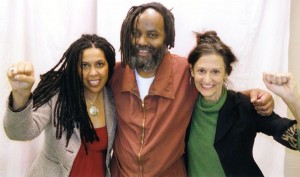
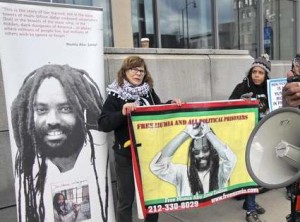
Mumia Abu-Jamal Update October 2018
Last week, attorneys for Mumia Abu Jamal argued in court that conflicts of interest led to unfair rulings against him in his longstanding case. As many know, Abu-Jamal was sentenced to death for the 1981 killing of Philadelphia police officer Daniel Faulkner. The case was riddled with constitutional violations, and his sentence was later commuted to life in prison without parole.
Recently, in the wake of the U.S. Supreme Court’s decision in Williams v. Pennsylvania, Mumia’s attorneys argued that his rights were violated after former district attorney Ron Castille failed to recuse himself in an appeals decision. At the time Castille was a state Supreme Court judge.
Judge Leon Tucker had asked the Philadelphia district attorney’s office to produce an internal memo that might show Castille— back when he was city district attorney — had direct involvement in pursuing Abu-Jamal’s death sentence. If he did, his later denial as Supreme Court justice of Abu-Jamal’s appeal, could be deemed biased.
Defense attorney Judy Ritter said: “Justice Castille has shown himself to be involved in this case, to be biased against a certain class of cases that our client falls into.” The Commonwealth argued that as district attorney, Castille was simply doing his job.
“It’s nothing remarkable that a DA would send a letter to the governor asking him to sign death warrants which the governor was required to do,” said attorney Tracey Kavanaugh. Emotions ran high, both inside and outside of the courtroom. Maureen Faulkner, the widow of Daniel Faulkner, stood up and cried in the middle of court proceedings when the judge announced that both sides would need to wait until December for any possible closure in the case. Presiding Judge Leon Tucker has indicated that he will make a ruling in the case some time after December 3, 2018.
Guest – Professor Johanna Fernandez, is a native New Yorker. She received a PhD in History from Columbia University and a BA in Literature and American Civilization from Brown University. Professor Fernández teaches 20th Century U.S. History, the history of social movements, the political economy of American cities, and African-American history. She has previously taught at Carnegie Mellon University in Pittsburg, PA and Trinity College in Hartford, CT and is, most recently, the recipient of a Fulbright Scholars grant to the Middle East and North Africa that will take her to Jordan in spring 2011, where she will teach graduate courses in American History. She is with the Campaign to Bring Mumia Home.
—-

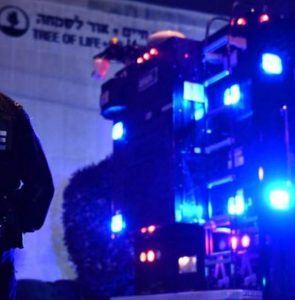
In Response to Pittsburgh, We Must Come Together as One
Last week, acts of hatred claimed the lives of 13 innocent persons in the United States. A white supremacist killed two African American persons in Kentucky. An anti-semite killed 11 Jewish persons in a synagogue in Pittsburgh where even more were wounded, including first responders and police officers.
Not surprisingly, the slaughter of the 11 Jews brought forth calls of the need for a strong Israel; the same response that followed anti-Semitic killings in France and Brussels.
It also inflamed political and theological differences between Israelis and American Jews. Israel’s Ashkenazi chief rabbi avoided saying “synagogue” because it is not Orthodox, but Conservative, a liberal branch of Judaism — because it is not Orthodox, but Conservative, one of the liberal branches of Judaism rejected by religious authorities who define the state’s Jewishness.
The attacker’s anti-refugee, anti-Muslim rants prompted some on the Israeli left — like many American Jewish liberals — compare the views of nationalistic leaders who influence their governments.
In Israel, longstanding animosity between left and right has escalated. Orthodox parties are hoping to increase their influence and Jewish law on day to day life; disputes about who cdan serve in the military and what stores can open on the Sabbath are rampant.
Guest – Phyllis Bennis is a fellow of the Institute for Policy Studies, where she works on anti-war, US foreign policy and Palestinian rights issues. She has worked as an informal adviser to several key UN officials on Palestinian issues. Her books including Calling the Shots: How Washington Dominates Today’s UN, and Understanding the Palestinian-Israeli Conflict.
—-

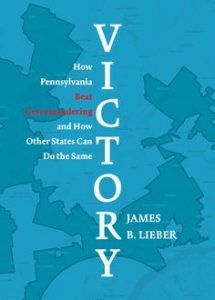
VICTORY: How Pennsylvania Beat Gerrymandering and How Other States Can Do the Same
An important victory against gerrymandering was recently won in the State of Pennsylvania in the case of League of Women Voters of Pennsylvania v. Commonwealth of Pennsylvania.
The first paragraph of the complaint lays it out. “This case is about one of the greatest threats to American democracy today: partisan gerrymandering. A partisan gerrymandering occurs when the political party in control of redistricting redraws congressional or state legislative districts to entrench that party in power and prevent voters affiliated with the minority party from electing candidates of their choice. The result is that general election outcomes are rigged – they are predetermined by partisan actors sitting behind a computer, and not by the voters.“
In Pennsylvania although the Democrats have more supporters than the Republicans Republicans had 13 seats in the US Congress and the Democrats had only five.
The U. S. Supreme Court has not been willing to rule on gerrymandering taking the position that there is no clear way to determine if there has been gerrymandering and therefore it is a non-judicable issue.
To get around this in 2018 Pennsylvania activists engineered a brilliant legal effort in the the state courts of Pennsylvania to attack the lopsided redistricting, and won after fighting pitched battles all the way up to the state Supreme Court. Now activists around the country can do the same. The next congressional redistricting occurs after the 2020 census: progressive need to be ready well before then.
We speak today with constitutional litigator James R. Lieber who has provided a real time report on effective trial lawyers, working to facilitate the will of the people. He explains the strategies of counsel and the evidence presented and has provided a roadmap to social justice litigants for pursuing constitutionally protected claims in state court based on the state constitution and avoiding federal review.
Guest – Attorney James B. Lieber is the author of 3 previous books, and a lawyer who focuses on constitutional, civil rights, and discrimination cases. He has won two cases before the U. S. Supreme Court and is widely published in magazines of national stature.
—————————————–

—————————————–

























